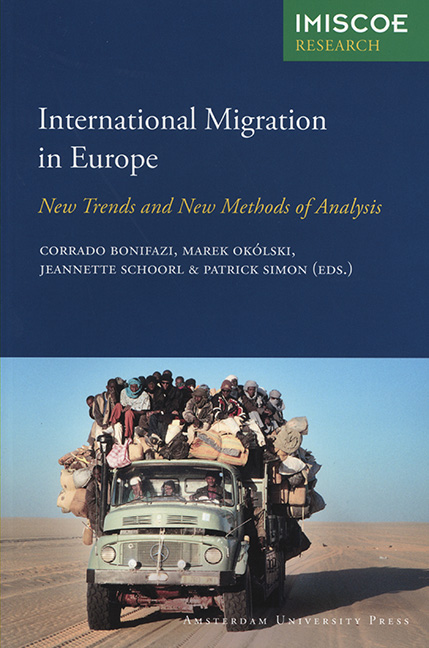Book contents
- Frontmatter
- Contents
- Preface
- 1 Introduction
- PART I NEW FORMS OF MIGRATION IN EUROPE
- PART II EVOLUTION OF REGIONAL PATTERNS OF INTERNATIONAL MIGRATION IN EUROPE
- PART III MEASURING INTEGRATION: IMMIGRANTS AND THE SECOND GENERATION
- PART IV SPECIAL SURVEYS IN INTERNATIONAL MIGRATION STUDIES
- List of Contributors
- Index
- Other IMISCOE Titles
12 - Discrimination Despite Integration: Immigrants and The Second Generation in Education and the Labour Market in France
Published online by Cambridge University Press: 22 June 2021
- Frontmatter
- Contents
- Preface
- 1 Introduction
- PART I NEW FORMS OF MIGRATION IN EUROPE
- PART II EVOLUTION OF REGIONAL PATTERNS OF INTERNATIONAL MIGRATION IN EUROPE
- PART III MEASURING INTEGRATION: IMMIGRANTS AND THE SECOND GENERATION
- PART IV SPECIAL SURVEYS IN INTERNATIONAL MIGRATION STUDIES
- List of Contributors
- Index
- Other IMISCOE Titles
Summary
For more than one and a half centuries, the ‘French model of integration’ has shaped policies and regimes concerning migrants. Even though the features of the model have encountered many changes over time, its main objective has remained quite stable: to enable immigrants to become French citizens within a generation (HCI 1993). To achieve this aim, the model prevents the reproduction of ‘foreignness’ or ‘otherness’ across generations by encouraging the naturalisation of migrants, and the automatic acquisition of French citizenship for the children of foreigners when they come of age. The key dimension of the French doctrine of integration – the implicit contract – is that the ‘invisibility’ of migrants and their descendants in public and political spheres will offer access to social mobility (Simon 2003). In return, the system grants minority groups de jure equal rights before the law regardless of their origin. The linkage between cultural assimilation and socioeconomic outcomes has been challenged by two major parameters of change: 1) the contesting of the paradigm of uniformity with requests for the recognition of ‘diversity’ in the French make-up; 2) the increase in discrimination against not only migrants but also for those belonging to the second generation, who should be protected by the legal provisions for equality.
In contrast with the classical theory of assimilation which maintains that structural assimilation in schools and the labour market (i.e. the reduction of the gaps between the status of migrants and natives) is closely linked with cultural assimilation (Alba & Nee 2003), we make the hypothesis in this paper that there is a potential mismatch between full cultural assimilation and widespread experiences of discrimination for certain groups of the descendants of immigrants in France. Evidence of quite a generalised cultural assimilation of the descendants of immigrants has already been stressed in scientific literature (Tribalat, Simon & Riandey 1996; Viprey 2002; Safi 2006). In this paper we focus on the educational attainment and position in the labour market of immigrants and the ‘second generations’. Has economic restructuring affected immigrants and subsequent generations in the same way? Or have the benefits of the ‘contract of integration’ proved able to produce equal access to socioeconomic upward mobility?
- Type
- Chapter
- Information
- International Migration in EuropeNew Trends and New Methods of Analysis, pp. 247 - 270Publisher: Amsterdam University PressPrint publication year: 2008
- 2
- Cited by



